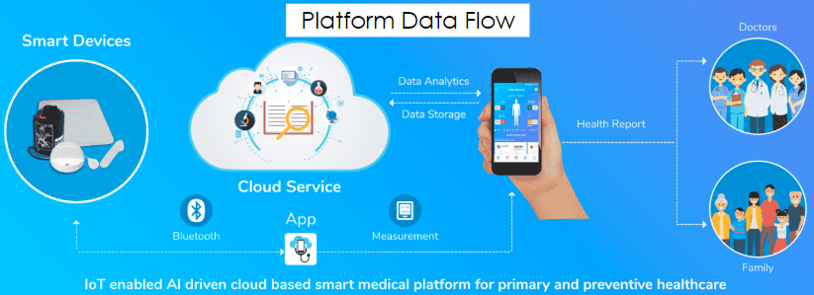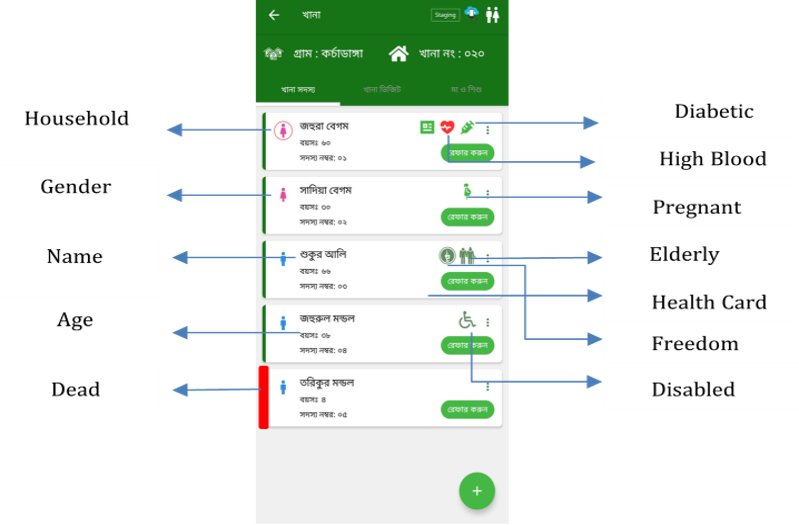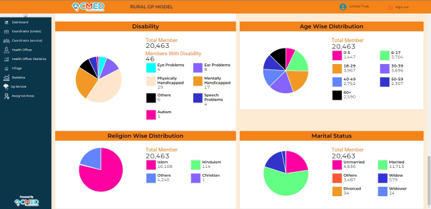iCRP
An Intelligence CVD Risk Profiling for early identification of Myocardial Infarction and Stroke in Bangladesh


Cardiovascular disease (CVD) is a major global health issue, causing over 6.2 million deaths annually, with LMICs like Bangladesh being heavily affected. In Bangladesh, myocardial infarction (MI) and stroke are particularly prevalent, posing significant challenges to the healthcare system. The iCRP project aims to develop a Machine Learning (ML)-based system for early CVD risk prediction by analyzing demographic, behavioral, physiological, and clinical data. This digital health intervention will provide early warnings and risk assessments, helping to reduce CVD-related mortality and morbidity. Additionally, the project will support sustainable development goals by enhancing healthcare outcomes and informing government policies. The initiative will create a comprehensive dataset, develop an ML-based prediction algorithm, and clinically validate the system’s effectiveness. This approach will alert individuals to lifestyle choices affecting their CVD risk, provide early predictions to reduce morbidity and mortality, map CVD risk geographically for better public health planning, support government healthcare policy and facility planning, reduce the economic burden on the healthcare system, and be accessible and cost-effective, reaching the mass population efficiently.
Video
Specifications
- Risk profiling can alert people to their lifestyle choices
- Prior prediction can reduce morbidity and mortality
- Risk mapping can be done
- Can be helpful for the Govt to ensure necessary facilities
- Can reduce economic burden on healthcare system
- Can be reached at doorstep for mass population
- Can be implemented with fewer resources and at a lower cost
Interface
Diagrams

Publications
Islam, S.M.S., Ahmed, S., Uddin, R. et al. Cardiovascular diseases risk prediction in patients with diabetes: Posthoc analysis from a matched case-control study in Bangladesh. J Diabetes Metab Disord 20, 417–425 (2021). https://doi.org/10.1007/s40200-021-00761-y Published: 15 February 2021 Volume 20, pages 417–425, (2021)
Abstract
This study aimed to investigate the estimated 10-year predicted risk of developing cardiovascular diseases (CVD) among participants with and without diabetes in Bangladesh.
Methods
We performed post hoc analysis from a matched case-control study conducted among 1262 participants. A total of 631 participants with diabetes (case) were recruited from a tertiary hospital, and 631 age, sex and residence matched participants (control) were recruited from the community in Dhaka, Bangladesh. Socioeconomic anthropometric, clinical and CVD risk factor data were collected from the participants. The 10-year estimated CVD risk was calculated using the Framingham Risk Score, which has reasonable validity in South Asians.
Results
The mean (SD) age of the participants were 51 (10) years. Total 52.3% of cases and 17.2% of controls were at high risk for CVD. The 10-year risk of CVD increased by age and was higher among males in both groups. Among the control group, high CVD risk was more prevalent among higher education and income groups. More than 85% of the tobacco smokers and 70% of chewing tobacco users in the case group were at high risk of CVD. Prevalence of high CVD risk among non-smokers was 8.6%. About 35% of hypertensive participants in the control group were at high risk of CVD.
Conclusion
Bangladeshi patients with diabetes showed a significant burden of CVD risk at a relatively younger age. Strategies for reducing tobacco use and improving BP control in people with diabetes is needed for lowering future CVD risks.
K. Zaman and K. Abdullah Al Mamun, "An evaluation of smartphone apps for preventive healthcare focusing on cardiovascular disease," 2017 4th International Conference on Advances in Electrical Engineering (ICAEE), Dhaka, Bangladesh, 2017, pp. 531-536, doi: 10.1109/ICAEE.2017.8255413. Published in: 2017 4th International Conference on Advances in Electrical Engineering (ICAEE) Date of Conference: 28-30 September 2017 Date Added to IEEE Xplore: 15 January 2018 Electronic ISSN: 2378-2692 DOI: 10.1109/ICAEE.2017.8255413 Publisher: IEEE Conference Location: Dhaka, Bangladesh
Abstract
Chronic/non-communicable diseases cause millions of deaths every year. These include heart diseases, diabetes, cancer and other diseases which are caused due to various factors such as lack of physical activity, improper diet, long-term smoking effects, and many more. However most of these diseases are preventable. Such diseases mostly affect developing or low income countries due to lack of a regular health monitoring system or proper management. Smartphone devices are currently being used in developed countries to overcome this issue and help people monitor their own health and change their lifestyle to avoid such illness. Throughout the world there are currently around 2.16 billion Smartphone users. Smartphone apps have become the trending technology globally due to their affordability and mobility. Healthcare apps also known as preventive healthcare apps, can help people maintain their lifestyle and health so as to prevent any future sickness. In this study our objective is to evaluate currently available healthcare journals, articles and top rated preventive healthcare apps. With the help of this review we were able to classify the different types of healthcare apps and we also proposed an app for cardiovascular disease (CVD). To observe people's feedback on our proposal we conducted a survey on 100 people. This study also emphasizes the importance of preventive healthcare apps for developing countries such as Bangladesh.
Partners








